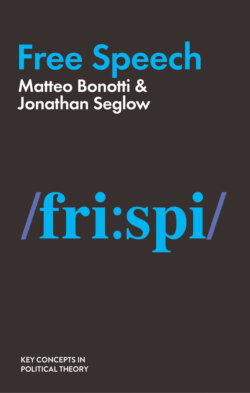Читать книгу Free Speech - Jonathan Seglow - Страница 11
Interconnections between the three theories
ОглавлениеAre the three theories examined in this chapter alternatives? Could we not endorse them all? There seems to be no reason to think that free speech cannot have multiple foundations (Greenawalt 1989), but at the same time we should be careful. Any justification for free speech also shapes our view of its limits; indeed, that is part of its point. While the autonomy theory is probably the most capacious, the truth theory has a harder time protecting free speech unconnected to the search for truth – much hate speech or commercial speech, for example – while on the democratic view hate speech could be taken as a contribution to democratic debate, or perhaps as undermining it, if it impedes others’ participation. In the chapters that follow we discuss in greater detail what these divergent implications are. To conclude this chapter, we say something briefly from the converse perspective. How are these theories related?
As we noted above, there is a clear affinity between Mill’s ideal of individuality and the ideal of personal autonomy. It is individualists who are most interested in truth in public affairs, and the search for truth, though a very social one – it must involve dialogue – is also one where individuals must exercise their independent critical powers by evaluating others’ views, by offering their own judgement to others, and by deciding what to believe. This is not the whole of autonomy – a person could conceivably exercise her deliberative capacities in the weighty public matters with which Mill was concerned, yet always follow the crowd in her personal life – but it is a substantial part of it. Conversely, the autonomous person has an interest in truth even in aspects of her life that are not public or political. A young woman contemplating a career in law or finance, for instance, has an interest in knowing which of those two professional fields is more marked by sex discrimination.
As far as the relationship between autonomy and democracy is concerned, there seems to be a clear analogue between the ideal of a person charting her own future and that of a political society doing the same thing. The democratic society should not be bound any more than the autonomous person by customs, norms, traditions or conventions that are beyond critical interrogation, revision, and sometimes even rejection. (The 2018 referendum in Ireland that we mentioned at the start, in which the Irish people voted to repeal the abortion ban rooted in its Catholic heritage, is a case in point.) The ideal of deliberative democracy, in particular, requires that individuals consider issues for themselves and exchange views on political matters. If, by contrast, we thought that democracy simply meant that each party should mobilise its base, appeal to people’s prejudices, and make them vote in secret without sharing their reasons, then democracy would not have much to do with autonomy, although, even on this pared-down view, it would still involve some free speech. As receivers of speech, we could also develop a democratic version of Scanlon’s autonomy argument. The idea would be that citizens cannot make informed rational decisions on matters of public concern unless they have had the opportunity to receive information from divergent viewpoints. It is not difficult to see how this argument could be developed to support pluralism in the media, for example, as well as a strict doctrine of content neutrality.
What about the relationship between truth and democracy? Recent work in democratic theory has explored its epistemic dimension, the way in which democratically made decisions are likely to be more cogent or well founded than decisions made by a small cabal. Although he defends this view, David Estlund (2008) also gives serious consideration to what he calls ‘epistocracy’ – that is, government exercised by those most likely to arrive at correct decisions, like the Guardians in Plato’s Republic. Conversely, given universal education, a public culture of deliberation, and the unique perspective on the world that is the preserve of every person, one might think that there is strength in numbers. Just as ten scientists working collaboratively are more likely to solve a puzzle than one working alone, the corporate body of citizens working together is better able to figure out what is in the public interest than a small epistocratic elite would. (This is in fact Estlund’s argument for democracy.) Of course, how far citizens really work together in a democracy is a moot point. The thoughtful, civic-minded model of the democratic process defended by deliberative theorists is far removed from the adversarial and populist democracy found across the globe. Much the same can be said about free speech itself; often disrespected, it remains an ideal – for the sorts of reasons we have canvassed in this chapter.
